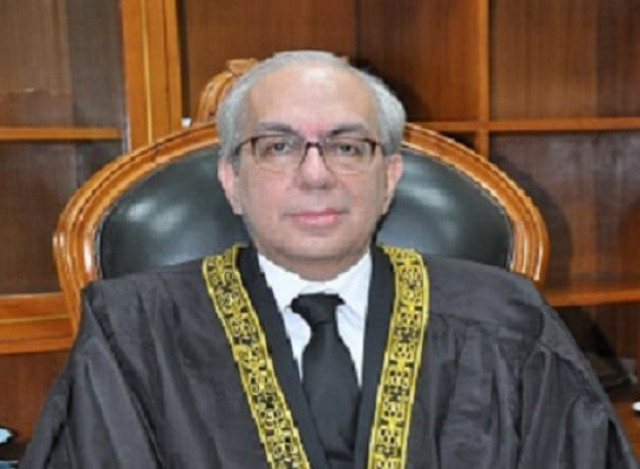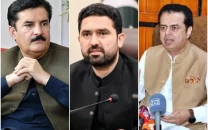SC judge observes defectors could 'resign honourably'
CJ Bandial notes need to take Pakistan towards a mature democracy

Justice Munib Akhtar on Friday remarked that the only "honourable way for defectors was to tender their resignations and go home".
The judge, who is part of the five-member bench headed by Chief Justice Umar Atta Bandial, made these remarks during the hearing of a case regarding the interpretation of Article 63-A, which deals with political defections.
The reference seeking interpretation of Article 63-A - inserted in the Constitution to prevent political defections during crucial votes - was filed by President Arif Alvi when Imran Khan was the prime minister.
The five-member bench of the SC hearing the presidential reference is headed by Chief Justice of Pakistan Umar Ata Bandial and comprises Justice Akhtar, Justice Ijazul Ahsan, Justice Mazhar Alam Khan Miankhel and Justice Jamal Khan Mandokhail.
During the hearing of the case Friday, CJ Bandial said that there was a need to take Pakistan towards a “mature democracy” and lawmakers needed to hold productive discussions in this regard. He added that politicians needed to make “sacrifices”.
As the hearing started, PTI lawyer Ali Zafar opened his arguments before the larger bench. He said the purpose of this law was to put an end to horse-trading and its violation was the same as the violation of the Constitution.
He said the vote cast in violation of Article 63-A would not be counted and added that the law applied to the members of political parties, not independent candidates.
Justice Ijazul Ahsan asked Zafar whether he was saying that votes would not be cast. “Defection and counting votes are two different things,” he said, asking that if there were no directions by a political party then will the votes be counted?
Read Article 63-A does not mention lifetime disqualification, says SC
“Are you saying that the votes will not be counted irrespective of directions by the party,” he asked. The PTI lawyer responded that the party head will issue directives and declarations against defectors will be issued afterwards.
Justice Jamal Khan Mandokhel said if the speaker would not count votes then there would be no crime. As per Article 63-A, a lawmaker will be de-seated for violating the party head’s directions by voting against the party lines. “The party head will issue a show-cause notice after the casting of the vote and they could also withdraw the notice if satisfied with the answer provided by the dissident lawmaker,” he added.
Justice Mazhar Alam remarked that the party chief would issue the declaration only after the vote was cast and added that the party head could also convey it to the speaker at the time of voting.
CJ Bandial asked whether he was referring to Article 96 during the Bhutto era as per which minority votes were not counted. “In order to end this menace and for the sake of national interest, such votes should not be counted.”
Justice Mandokhel said the political parties should resolve this issue on their own. He said only one political party, the PTI, was against defections. Are you asking the court to ignore all other parties and decide the case in favour of a single party, he asked.
Read More: LHC directs President Alvi to deputise person to administer CM Punjab oath-taking
‘Cancer of deviation’
Addressing PTI counsel, who said that every parliamentary party functions with a certain regulating constitution under which the majority decides the matters, Justice Mandokhel asked why the “cancer” of deviation was not cured.
“Most of the parties in front of us are against your position. Why do you expect that we will obey you except for the majority?” he asked while noting that only one political party adopted views against the deviant members.
Zafar said that the right of interpretation lay with the court. “I can understand that the court does not want to go beyond the interpretation.”
Justice Ahsan observed it was "very clear" that legislation was the parliament's job and interpreting those laws was the court's duty.
"The purpose of Article 63-A's inclusion was to end the cancer of defection," he added.
Justice Ahsan observed that it was very clear that it was the job of the parliament to legislate while interpretation was the prerogative of the SC.
“The purpose of including 63-A in the Constitution was to eradicate the cancer of deviation,” he added.
The chief justice directed the counsel to submit detailed written arguments.
Adopting Barrister Ali Zafar's arguments, the PML-Q lawyer said that Article 63-A was a “protective wall” against the no-confidence motion.
PML-N lawyer Makhdoom Ali Khan argued that the term of the National Assembly was five years and a defector could only be disqualified for the respective term. He said the PTI brought the reference to save Imran from a no-confidence motion. The court announced a historic judgement by restoring assemblies, he added.
CJ Bandial said the court wanted to reach a decision on Article 63-A as soon as possible. “We make decisions as per the Constitution and our conscience so that Pakistan could prosper,” he added.
Makhdoom said there was no incriminating material regarding defections in front of the court.
CJ Bandial asked whether the court was bound to interpret the Constitution with respect to the question it was asked. The PML-N lawyer said the court could use Article 184/3 as well. He added that Article 63-A was not inserted to stop disloyalty from parties.
The court will now take up the case after Eid.



















COMMENTS
Comments are moderated and generally will be posted if they are on-topic and not abusive.
For more information, please see our Comments FAQ